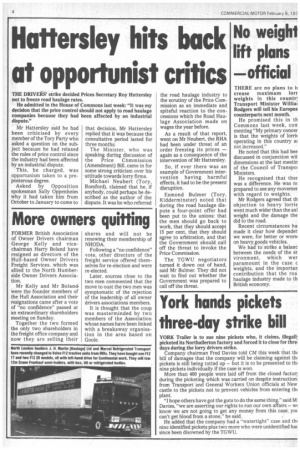Hattersley hits bock
Page 6

If you've noticed an error in this article please click here to report it so we can fix it.
at opportunist critics THE DRIVERS' strike decided Prices Secretary Roy Hattersley not to freeze road haulage rates.
He admitted in the House of Commons last week: "It was my decision that the price control should not apply to road haulage companies because they had been affected by an industrial dispute."
Mr Hattersley said he had been criticised by every member of the Tory Party who asked a question on the subject because he had relaxed the rules of price control since the industry had been affected by an industrial dispute.
This, he charged, was opportunism taken to a preposterous degree.
Asked by Opposition spokesman Sally Oppenheim why it had taken him from October to January to come to that decision, Mr Hattersley replied that it was because the consultative period lasted for three months.
The Minister, who was speaking during discussion of the Price Cbmmission (Amendment) Bill, came in for some strong criticism over his -attitude towards lorry firms.
Michael Neubert (Tory, Romford), claimed that he, if anybody, could perhaps be described as the author of the dispute. It was he who referred the road haulage industry to the scrutiny of the Price Commission as an immediate and spiteful reaction to the concessions which the Road Haulage Association made on wages the year before.
As a result of that report, went on Mr Neubert, the RHA had been under threat of an order freezing its prices — again as a consequence of the intervention of Mr Hattersley.
So, if ever there was an example of Government intervention having harmful effects, it had to be the present disruption.
Esmond Bulmer (Tory, Kidderminster) noted that during the road haulage dispute a four-point offer had been put to the unions: that the men should go back to work, that they should accept 15 per cent, that they should agree to arbitration, and that the Government should call off the threat to invoke the Price Commission.
The TGWU negotiators turned it down out of hand, said Mr Bulmer. They did not wait to find out whether the Government was prepared to call off the threat.




































































































